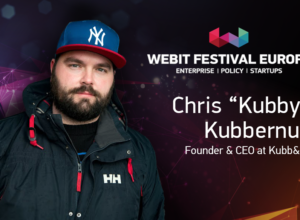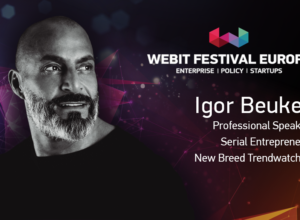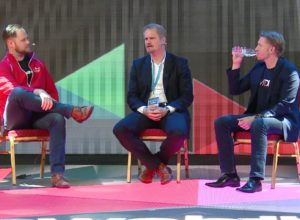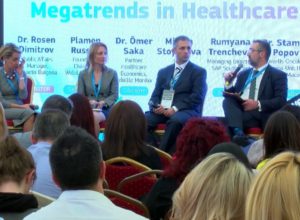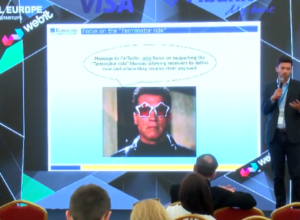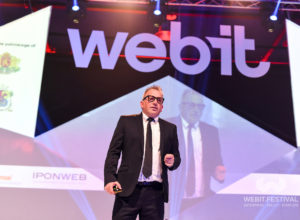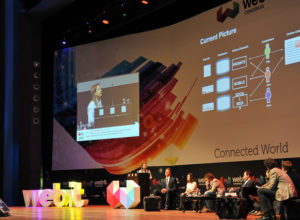Tag: Global Webit Congress
Webit.Festival Europe 2018 presents: Chris ‘Kubby’ Kubbernus
Here you can see a full list of the confirmed speakers at Webit.Festival, while here you can get all the information you need about the tickets for the event.
We need to go back to good, credible and authentic storytelling that brings value to the consumer
The notion of change is essential in the 21st century. We are developing way faster than we thought we would in 2008, for example. We now consider diseases treatable, in comparison with just 10 years back; companies have to adapt to change, but this would be impossible without certain people - people who envision the future, who encompass change and apply it. Chris Kubbernus, or Kubby, as his friends call him, named #1 Business Guru on Snapchat by Forbes, will be among the speakers at Webit.Innovate! Summit at the next Webit.Festival Europe 2018 on 26th - 27th June 2018. The one thing Chris wishes people to remember out of his talk would be that things change. According to him, companies today are not using technologies to their fullest potential - not seeing what’s happening in the marketplace and cannot react adequately.“ If you say to an organization: 'I think you should use Snapchat, or get on Instagram', they’d roll their eyes and say: 'Why would we do that?’ What they don’t realize is that these things quickly become mainstream, and that’s where they’re losing. They’re actually ignoring what’s going on in the marketplace, thinking that it’s just a trend and therefore not doing anything about it. Change happens and organizations have to recognize that and act on it before it gets too expensive.”
Chris is originally from Canada, but he likes to say that he was “imported in Denmark” by his wife. The difference in the two continents is obvious, in terms of marketing, but what exactly Chris finds drastically different is:Americans and Canadians are more trusting in their advertising. If you make a claim, they might take that as face value, whereas I think with Europeans, you have to have a more soft approach.
Living in Northern Europe, Scandinavians, he continues have a different approach to advertisement. People there are more likely to doubt the quality of the product whereas the Americans would trust the ad and will expect the same results.In social media, I find that Europeans are more conservative. They are less likely to share and like something or to engage with content. I think it takes a lot to move them to action, where in North America, in particular, it seems to be easier. People are more relaxed towards sharing on social media and voicing their opinions.
Chris was a speaker at the first Snapchat conference - we saw the rise of Snapchat, we all know those Snapchat glasses, don’t we. We are now also seeing the fall of Snapchat as a platform, it doesn't attract so much audience, in fact, its users are youngsters. It just somehow feels Snapchat will not last much longer, although, Chris says, you have to wonder why the biggest social networks in the world are mimicking what Snapchat did.“ I think, in a way, Snapchat is being replaced by Instagram. Instagram is doing a very good job of copying and making their own new features. But Snapchat is a playground, still much more than Instagram. And Facebook sees that they are losing the younger generation, so I think that if Snapchat can continue being the anti-Facebook, they will stay relevant. They just need to retain that identity. “
Besides Facebook, another huge platform is so very widely used - Instagram. The main differences in the two platforms, Chris explains like this:On Facebook, content is consumed slower and with more thought. People are less likely to like on Facebook, whereas on Instagram, there’s less exposure and more anonymity. Instagram is a little hedonistic in some ways, while Facebook is your core of friends and family, where you have to be more ‘considerate'.
Unlike some other social platforms, like Snapchat, for example, Facebook will be present in our lives for many more years. It is a place where you can document your entire life and in terms of ‘replacing’, Instagram will not replace Facebook as a social media platform. At the end of the day, “both platforms are playgrounds for displaying different parts of our personalities”. My social media predictions for 2018 is a continuation and examination of influencer-marketing and how much we let social media influence us, says Kubby. The psychological effect of social media will continue to determine the way we communicate and perceive information and the trend of what is real and what is fake will determine the consumer’s behaviour.“ Right now, digital marketing is losing consumers because of disinterest and mistrust in fake influencer-marketing. We need to go back to good, credible and authentic storytelling that brings value to the consumer. “
Webit.Festival Europe 2018 presents: Igor Beuker
Advertising may win quarters, innovation wins decades
He is a new breed trendwatcher, energetic professional communicator, serial entrepreneur, award-winning marketing strategist and this will be his 4th Webit event - three times in Sofia and once in Istanbul, Igor Beuker has lots to share about his Webit experience.“ Amazing conference, very well-organized, fantastic setting and backstage program, great speaker line-up, and very important to me as a professional public speaker and human being: the connection with the audience (at the event and on social media) is rare and heartwarming. “
Igor is among those speakers who have a special connection with their audience. Here is what he says about the audience in Sofia, and to his fans, in particular:“ The connection with the audience in Sofia, is really one of a kind. I can’t explain the feeling.It’s one of the reasons why - out of 150 international talks each year - Webit is one of the highlights I really look forward to ”
We cannot deny that the difference between Sofia and Istanbul is enormous. Here is what Igor says about his experience:
“ Istanbul is a huge international city and the conference is a bit more business focused and formal than in Sofia, was my experience. I love the culture and the passion of the people in Turkey, and some of the attendees became business partners and friends.”
Bulgaria and Sofia are aiming at becoming a digital hub for CEE and the attitude and approach towards this is a bit more casual. In the same time, however, we coordinate with the government and local authorities, and as from last year, we were incredibly proud to announce that Webit is the flagship event of the Presidency of the Council of the European Union. The EU Commissioner for Digital Economy and Society Mariya Gabriel is chairing Webit's Plenary Sessions and is a patron of Webit.Festival along with The Government of Bulgaria and the Mayor of Sofia.” Last year I shared the stage and the dining table with the president of Bulgaria and the Mayor of Sofia, which is a great opportunity to share ideas.”“Burning Man meet TED” and “Math Man in a world of Mad Men”...
...are just a couple of the new terms that were invented by the Bulgarian audience. At this year’s Webit.Festival Europe edition in Sofia, Igor will further develop his Mad Men vs. Math Men theory."Can I stretch my Mad Men vs. Math Men theory and framework even further? The Webit audience will give me the answer with their reviews and social feedback. My team and me value what they say and I even reinvent my speeches and one-liners for my talks, based upon what they highlight. That legacy brands and incumbents need to get out of their comfort zones, because that’s where the magic really happens. My bold style and personality I can’t change at 47, but the audience feels I know my why and I keep walking towards my purpose. Next-level change and reinvention is needed. Big is only good when big is smart: Advertising may win quarters, innovation wins decades.”
Igor is loved by the companies, adored by his fans and audience everywhere he goes and also by the media.
He gave a very special, exclusive, interview for a Bulgarian media. You can watch his interviews here, where he elaborates his Mad Men vs. Math Men theory in a more simple way. Igor’s answer to “how would you describe the atmosphere at Webit, he says: “Hard to describe, but when I look at the audience tweetback on my site, I get a huge smile on my face and I can’t wait to be back!”We can’t wait to welcome you again, Igor! You have a very special place in our city and our hearts.
“ Experiencing the last three years, I expect Webit 2018 to be even bigger and better than the previous editions. If that is even possible.”
Sure it is! You don’t believe us? Take a look at the amazing speakers line here and the one of the kind networking opportunities here. You wish to attend? Book your ticket here.Dancing with an Elephant: Corporates & Startups
Apply for our Founders Games and get the chance of being among the 200 startups presenting their innovative idea in front of investors, business leaders and all attendees of Webit.Festival 2018.
Corporates & startups. Two forces of the business world which are as much different as they need each other. Brian Collins (AngelHack), Jonas Jacobi (IBM) & Matthias Schanze (Siemens) put some light on this complex relationship Mr. Schanze described as”Dancing with an elephant”
The open API (Application Programming Interfaces) revolution took of 5 years ago
A familiar example of APIs in action is the ability to sign into different accounts or services with our Facebook login. We can log into Pinterest, for example, by using our Facebook login credentials. That revolution was built on the idea that corporates could start opening up their technology for developers & startups. By doing so they were able to find a whole new strategy. In that way, the strategy shifted. It shifted from a B2B or a B2C focus to a Business to Developer focus. As such, innovation programming quickly went on the rise. Corporates began looking at developers and startups as a whole new strategy to their strategic plans and in doing so they’ve started working and finding ways to engage with startups & developers at an earlier and earlier stage.Why the relationship between startups & corporates is important
Big companies have more than enough funds to put in place and do their own research. What these companies have noted is that a lot of innovation occurs outside the company itself. That’s one of the main reasons companies like IBM, Siemens and others of this size have been involved in the startup ecosystem for quite some time already. Startups do set trends and it’s important for large corporations to always keep an eye on new trends and new technologies that are emerging fast. So what are these companies looking for? Big ideas. Great technologies. And innovations. Innovations that disrupt industries and possibly create new markets. Transformation, not only for the company itself but for its clients as well.Value proposition to the corporates
Corporates are well aware that they cannot invent everything by themselves. Co-creation and co-innovation with startups is a key point of their development. The transition is turning from internal Research & Development departments inside of corporates towards creating an external community, a liquid R&D force in essence. There’s the notion that most big corporates engage with, acquire or invest their funds in startups that already make some millions of revenue but in reality that is not the case anymore. The practice of an early engagement has grown immensely and that calls for more fair chances for more startups.Megatrends in Healthcare
Webit.Festival Europe 2017 shaped the milestones for all things digital in healthcare
The topic will be continued in 2018 with a separate 2-day event called Webit.Health co-chaired by Plamen Russev, the Chairman of Webit Foundation and Prof. Shafi Ahmed, Co-founder and surgeon of Medical Realities. Make sure to book your tickets now, at the Super earlybird price here. 2017 health Summit saw some of the biggest companies’ representatives in the world sitting together in a panel discussion - Rumyana Trencheva, Managing director SAP SountEast Europe, Mr Omer Saka, Partner at Deloitte, Dr Stamen Popov, General Manager Oncology of Novartis and Milena Stoycheva, CEO of JA Bulgaria, moderated by Dr. Rosen Dimitrov, Public Affairs Manager at Novartis. You have a vast experience in healthcare and innovations and wish to tell us about it - apply for speaking here. Ms Trencheva gave a good start of the discussion assuring that megatrends all over the world are not something selected, they are not happening in selected, VIP, countries - they are spreading. The contemporary consumer is demands more and more from the pharmaceuticals, from the technology companies and it is becoming ever more challenging to make sure consumers’ needs are met.The change of our perception on what healthcare is
Another megatrend that was clearly stated by Mr Saka is the change of our perception on what healthcare is do we mean a pill, a medical device of some kind or a hospital bed. The key solution is finding a way for these three elements to work together in the modern healthcare system. Furthermore, the matter of how much we, as consumers, pay for healthcare came to forefront. It is expected that in the next 10 years or less patients will be treated and will be provided with solutions that go beyond the pill - and this is for the mass, not only for the selected ones who can afford it. Dr Popov clearly stated that pharmaceutical companies no longer rely on the pill as a method of treatment - they broaden their vision using the digital technologies and these solutions will very soon come to patients who need them. This gives a huge advantage - transparency. Each of us, as human beings, is a data center, based on the choices we make every single day. In fact, transparency in healthcare system is a major block each of the technology companies all over the world are trying to achieve.With this follows one of the most important Megatrends - prevention as the form of treatment
It is considered that people nowadays take more and more care of themselves - in the form of wellness. We will have a huge number of population taking great measurements to maintain their health; in order to survive, people will take ownership on one’s health, environment and the ecosystem as well as putting efforts into changing the ecosystem. Finally, all these megatrends are impossible to happen without collaboration of technology companies, startups to bring fresh ideas and doctors. There’s no need for an engineer to develop an app by himself when they clearly don’t know specifics, rather, it is the healthcare industry to develop and change the ecosystem. Going out of the pharmaceutical industry, the biggest companies are also working on building connections with physicians and to use these relations to integrate new type of companies into this world. Webit.Health will continue this kinds of discussions in 26th - 27th June with ever more interesting guests who will show in action and demonstrate the modern healthcare - something that is happening now, not some time in the future. If you have an interesting idea and your company is less than 5 years old - show it by applying here.M&A as a Fuel to Innovation
Sriram Prakash, the Global Lead for Innovation M&A and Venturing Services at Deloitte was one of the speakers at Webit.Festival Investments Summit who shared his insight about fueling growth through innovation M&A.
Living in an economy of expectations
An innovation can come from anywhere.It can come from a small unknown town in India, it can come from a booming city like New York, it can come from anywhere. If you want to turn your innovation into a billion dollar business though, you need some extra things than the idea itself. You need an ecosystem, you need entrepreneurs and corporates, you need the governments and different policy makers. And in fact, there are very few cities and ecosystems allowing you to do that but this doesn’t mean that your ideas can’t travel. Ideas have no boundaries anymore and that’s become quite an advantage for all market players. Markets are full of uncertainty today, they are getting saturated and there’s a backlash against globalization. For the past three years revenue growth rates has been on the decline but the share price are on the rise. That’s why innovation has become such a strong priority for companies to grow. Mergers & acquisitions is one of the ways for companies to tap into innovations happening outside of their private ecosystem rather than trying to focus on purely growing organically.More and more non-technological companies are investing in and acquiring tech companies
This means that a nowadays startup has the option of not just one but more exits and more than one sectors that could be interested in its particular innovation. The process is not one-way only. It’s not only old companies trying to go into digital. Startup companies are also buying some old style companies depending on their needs. Most of the disruptors under the scope of corporates are AI, Robotics, Big Data, Analytics and IoT, finally coming to a stage where the commercial potential can be realised. Venture capital & investment companies trying to get their way through the field should be better in the way of trying to find what people want rather than trying to invent the next Facebook or Uber. The biggest battle is for the future of consumers and the consumer industry as changing as it is. Companies of different sectors are merging and acquiring others out of their area of business and specialization. We see healthcare industry mixing with Fintech, IoT with Data and all together. For the first time there’s a genuine convergence between non-traditional sectors converging around a particular opportunity.Trends in cross-border payments
[embed]https://www.youtube.com/watch?v=OsBtydb2Pqc&t[/embed]
2017 Webit stage saw the cooperation of two people - the one with years of experience in the sphere of fintech - Michel Stuijt, the CEO of Eurogiro, and the great, innovative mind Or Benoz, co-founder of Rewire. They both investigated the trends in cross-border payments.
In his experience, Michel opens the discussion, he outlined a four expectations of what people see in the future of payments:
-
Free
-
Fast, if not instant
-
Secure
-
Full withdrawal
The main trend, the future in financial technology, lies in the cooperation.
The duo on the stage is quite a good example - the financial institution Eurogiro and the innovative products Rewire create is a great example in cross border cooperation. In 20 years time the only solution for regulation of the blockchain, fintech, trading, transactions, etc, is the good cooperation between all stakeholders. Because, let’s face it - there are few companies that create new technologies in the world today. In 5 - 10 years from now, we will see many technology companies focusing on consumer experience, making the experience amazing; on the opposite side, the financial institutions, organizations, etc, already have financial instruments, licenses and the infrastructure. The future of cross border payments lies in the cooperation between both ways.Intangible assets – blockchain relation
Do your friends ever talk about blockchain, fintech, transactions, etc.. and you just sit there not knowing what to say? Alexander Shulgin is here to bring some light and educate us on these terms.
Bitcoin, he explains, is not a currency, although we use it like that. It is in fact a decentralized distribution data based technology based on trust, used for transactions, agreements, etc.
 The infographic shows the starts of tomorrow and they are based on patent IP and full copyright.
A case study that Alexander presents can be seen here:
[embed]https://www.youtube.com/watch?v=ZScSjPjPEqg[/embed]
Keep up with Webit.Festival 2018 agenda with a series of startup events such as the Founders Games, Startups & Investors Summit, nurturing the connection between these two intertwined parties. And more.
The infographic shows the starts of tomorrow and they are based on patent IP and full copyright.
A case study that Alexander presents can be seen here:
[embed]https://www.youtube.com/watch?v=ZScSjPjPEqg[/embed]
Keep up with Webit.Festival 2018 agenda with a series of startup events such as the Founders Games, Startups & Investors Summit, nurturing the connection between these two intertwined parties. And more.
Do you believe that blockchain affects only banks and banking institutions? Well, you are wrong.
The first companies to use this technology were not banks, nor are the ones that use it today - companies like Apple, Alphabet, Microsoft, Exxon Mobile. It will disrupt firstly intellectual property, for example, as well as other intangible assets. Nowadays, a priority of all the businesses is to establish a global database for intangible assets. Without them, businesses cannot do any IoT, anything that is based on blockchain. It became clear that blockchain and Intangible assets go hand in hand, but they also create a platform for- knowledge economy and
- creative economy
 The infographic shows the starts of tomorrow and they are based on patent IP and full copyright.
A case study that Alexander presents can be seen here:
[embed]https://www.youtube.com/watch?v=ZScSjPjPEqg[/embed]
Keep up with Webit.Festival 2018 agenda with a series of startup events such as the Founders Games, Startups & Investors Summit, nurturing the connection between these two intertwined parties. And more.
The infographic shows the starts of tomorrow and they are based on patent IP and full copyright.
A case study that Alexander presents can be seen here:
[embed]https://www.youtube.com/watch?v=ZScSjPjPEqg[/embed]
Keep up with Webit.Festival 2018 agenda with a series of startup events such as the Founders Games, Startups & Investors Summit, nurturing the connection between these two intertwined parties. And more. Ethics in data usage
You must have heard about data
Just open up any news website, newspaper and the figures are there. It’s the buzzword of our time - everybody is talking about data, flow of data, security, protection, etc. As is technology. You use technology everywhere - all around you. Уou use it every single day. Аnd that’s exactly where the real danger lies. The Estonian Prime Minister, Kersti Kaljulaid, is saying that society is changing because of the washing machine, not because it landed on the Moon, quoted by local media seems more inline with what’s happening today that any other jibber jabber. That’s to say, simple, everyday technology really changed the way people live, not high end software that very few people possess.Now that you are scrolling facebook..
..how do you know that one of your friends is not exactly your friend? Or perhaps somewhere out there is holding you personal data for God-knows-what? Well you can’t. Internet and the websites offer anonymity to a huge extend. At least to somebody who knows how to work with data. For the artificial intelligence there are no hidden spots. Jason Jercinovic, the Global Head of Marketing innovation of Havas, tackled the ethical issues of companies using data, personal data, for various purposes @Webit.Festival Europe 2017. Machines today know all about you - the emojis you use, the personal thoughts you share and anybody with access to that can easily use this information. Why is it OK for a car company to know its customers, their behavior and send newsletters with the innovations they would be interested in? But it’s not OK when terrorist groups research and target young men and women to enter the military? Companies are still struggling to define what sensitive data is and how to protect it. The lack of clear regulations doesn’t help in fighting the problem. The first steps towards some kind of decision have been taken. In January 2012, the European Commission proposed a comprehensive reform of data protection rules in the EU. The directive will effectively enter into force from May 2018.This and more will be discussed @Webit.Festival Europe 2018
Webit is the flagship event of a European digital week part of which will be the Digital Assembly, the annual high level gathering of European executives. Topics like Data encryption, privacy & security as well as data flow and its ethical implications are part of the Innovation Summit. They will be covered by experts and legislators. If you want to keep up with the latest trends in the world of digital economy and technology, then Webit.Festival is the right place for you. Visit our website and book 2 in 1 of our Super Earlybird tickets for Webit.Festival Europe 2018. You can watch Jason Jercinovic’s keynote here: [embed]https://www.youtube.com/watch?v=vlDC9VSxUCU[/embed]The Future of Big Data, Big Cloud and Connected Devices
We are living in a constantly changing, complex, interconnected world. We are seeing all kinds of connected devices all around us both at home and at the enterprise. All these connected devices create enormous amount of data, Big Data. The great challenge facing us is what to do with it. How to make it useful.
At the blue track of the Global Webit Congress we are presenting speakers from leading companies that will discuss trending topics like Big Data, Big Cloud, Connected Devices and IoT.
